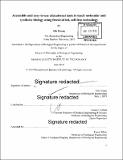Accessible and easy-to-use educational tools to teach molecular and synthetic biology using freeze-dried, cell-free technology
Author(s)
Huang, Ally.
Download1129457094-MIT.pdf (31.96Mb)
Other Contributors
Massachusetts Institute of Technology. Department of Biological Engineering.
Advisor
James J. Collins.
Terms of use
Metadata
Show full item recordAbstract
Hands-on demonstrations greatly enhance the teaching of STEM concepts and foster engagement and exploration in the sciences. While numerous chemistry and physics classroom demonstrations exist, few biology demonstrations are practical and accessible due to the challenges and concerns of growing living cells in classrooms. Here I introduce a platform to develop hands-on molecular and synthetic biology educational activities based on easy-to-use, shelf-stable, freeze-dried, cell-free (FD-CF) reactions, which are simply activated by water. By using fluorescent proteins as a visual output, I created a variety of engaging modules using this platform that can teach the central dogma of biology, how certain cellular functions work, and other basic molecular biology topics that are otherwise difficult to easily teach in a hands-on manner. By expanding the platform to other non-visual outputs (such as smell or touch), as well as further incorporating components, such as RNA switches, I also developed modules that can teach more advanced biology topics, such as biochemistry, biomaterials, and synthetic biology, as well as basic laboratory skills such as pipetting, experimental design, and the scientific method. Pilot testing of a prototype kit based on these elements were tested in classrooms across the country and initial results suggest that the activities are accessible, easy to use, educational, and engaging for high school students. Overall, the platform introduces low-cost, user-friendly, and hands-on activities that can be used in classrooms to improve the quality of biology education and open the door for student-driven, independent explorations in the life sciences.
Description
Thesis: Ph. D., Massachusetts Institute of Technology, Department of Biological Engineering, 2019 Cataloged from PDF version of thesis. Includes bibliographical references (pages 186-197).
Date issued
2019Department
Massachusetts Institute of Technology. Department of Biological EngineeringPublisher
Massachusetts Institute of Technology
Keywords
Biological Engineering.